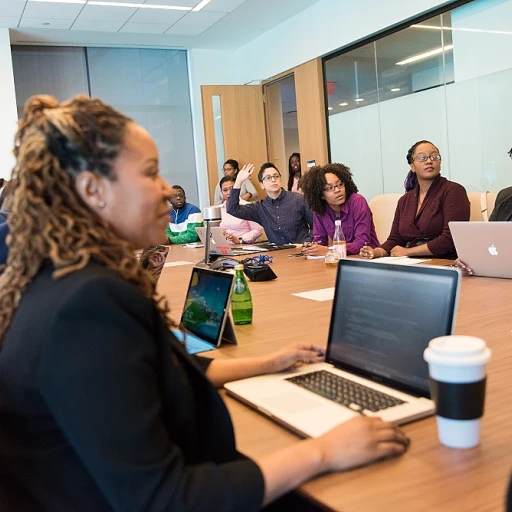The Importance of Professional Mentoring in Design
The Role of Mentoring in Shaping Design Careers
In the ever-evolving world of UX/UI design, professional mentoring stands as a cornerstone for personal and career development. The design industry is not just about creating visually appealing digital products; it's about crafting user experiences that resonate with the audience. As designers navigate through the complexities of design trends, usability testing, and the latest digital products, having a mentor can provide invaluable guidance.
Mentoring in the design field is crucial for several reasons. Firstly, it helps bridge the gap between theoretical knowledge and practical application. While design blogs and case studies offer insights into best practices and the latest trends, a mentor brings real-world experience and expertise to the table. This is particularly important in a dynamic market like India, where digital marketing and app design are rapidly growing sectors.
Enhancing Skills and Building Confidence
A mentor aids in honing a designer's skills, whether it's in visual design, web design, or mobile app development. By sharing their own experiences and challenges, mentors help mentees build confidence in their abilities. This confidence is crucial when designers are tasked with creating user-centric products that align with business goals and industry standards.
Moreover, mentors can provide personalized feedback on design projects, helping mentees refine their approach to the design process. This feedback loop is essential for continuous improvement and professional growth. With the guidance of a mentor, designers can better understand the nuances of user experience and the impact of their work on end-users.
Networking and Career Advancement
Another significant benefit of professional mentoring is the opportunity for networking. Mentors often introduce mentees to a broader network of industry professionals, design studios, and agencies. This expanded network can lead to new career opportunities, collaborations, and insights into the latest industry trends.
In conclusion, professional mentoring is a vital component of a successful career in UX/UI design. It not only enhances a designer's skills and confidence but also provides a pathway for career advancement in the competitive design industry.
Identifying the Right Mentor for UX/UI Design
Finding Your Ideal Mentor in UX/UI Design
Identifying the right mentor is a crucial step in advancing your career in UX/UI design. A mentor can provide valuable insights, guidance, and support, helping you navigate the complexities of the design industry. But how do you find the perfect mentor who aligns with your career goals and aspirations?
Understanding Your Needs and Goals
Before seeking a mentor, it’s essential to understand your own needs and career objectives. Are you looking to enhance your skills in mobile app design, or perhaps you're interested in exploring the latest trends in digital products? Clarifying your goals will help you find a mentor whose expertise aligns with your ambitions.
Researching Potential Mentors
Start by researching potential mentors within the UX/UI design community. Look for professionals who have a strong background in user experience, usability testing, and visual design. Indian design blogs and websites can be excellent resources for discovering experienced designers who are active in the industry.
- Check Design Blogs: Follow design blogs that focus on UX/UI trends and case studies. These platforms often feature interviews and guest posts by leading designers, offering insights into their work and mentorship opportunities.
- Attend Industry Events: Participate in design conferences and webinars to connect with industry experts. Networking at these events can lead to potential mentorship relationships.
- Utilize Social Media: Platforms like LinkedIn and Twitter are valuable for connecting with design professionals. Engage with their content and express your interest in learning from their experience.
Evaluating Mentor Compatibility
Once you've identified potential mentors, evaluate their compatibility with your career path. Consider their experience in areas like web design, app design, and digital marketing. A mentor with a background in a design studio or design agency may offer practical insights into the business side of design.
Additionally, assess their teaching style and availability. A mentor who is approachable and willing to invest time in your development will be more beneficial in the long run. Remember, the best mentoring relationships are built on mutual respect and a shared commitment to growth.
By taking these steps, you can find a mentor who not only guides you through the design process but also helps you stay updated with the latest design trends and best practices in the industry.
Leveraging Indian UX/UI Design Blogs for Learning
Harnessing Indian Design Blogs for Expertise
The vibrant world of Indian UX/UI design blogs offers an immense pool of knowledge and insight for both budding and experienced designers. These digital platforms provide not just inspiration but also valuable lessons on the latest trends and best practices in the industry.- Comprehensive Information: Design blogs in India often cover a wide range of topics, from mobile app and website design to the intricacies of user experience and usability testing. This makes them an excellent resource for refining design skills.
- Industry Trends: Blogs frequently update with the latest trends in digital marketing and experience design, allowing designers to stay ahead in the rapidly evolving digital arena.
- Case Studies and Real-World Applications: Many blogs delve into case studies, offering a glimpse into practical applications and the success stories of various design agencies and studios.
- Community and Collaboration: Indian design blogs often encourage interaction through comments, enabling a community of designers to share insights, experiences, and constructive feedback.
Building a Strong Mentor-Mentee Relationship
Creating a Successful Mentor-Mentee Dynamic
Building a strong mentor-mentee relationship is pivotal in the field of UX/UI design. This partnership is not just about exchanging knowledge; it's about fostering a connection that facilitates growth and development for both parties involved. Here are some key aspects to consider:
Clear Communication and Expectations
Establishing clear communication channels is crucial. Both mentors and mentees should articulate their goals and expectations from the outset. This ensures that both parties are aligned and can work towards common objectives. Regular check-ins and feedback sessions can help maintain this alignment.
Mutual Respect and Trust
A successful mentor-mentee relationship is built on mutual respect and trust. Mentors should respect the mentee's ideas and creativity, while mentees should value the mentor's experience and guidance. Trust forms the foundation of any productive relationship, enabling open and honest discussions.
Active Listening and Empathy
Mentors should practice active listening, showing empathy towards the mentee's challenges and aspirations. Understanding the mentee's perspective can provide deeper insights into their needs and help tailor guidance accordingly. This empathetic approach enhances the overall user experience of the mentoring process.
Encouragement and Support
Mentors play a critical role in encouraging mentees to push their boundaries and explore new design trends and techniques. Providing constructive feedback and celebrating small victories can significantly boost the mentee's confidence and motivation, essential for career advancement in the design industry.
Commitment to Continuous Learning
Both mentors and mentees should commit to continuous learning. The design industry is ever-evolving, with new trends and technologies emerging regularly. Engaging with Indian UX/UI design blogs and case studies can provide valuable insights and keep both parties updated with the latest trends and best practices.
By focusing on these elements, mentors and mentees can build a relationship that is not only beneficial for their professional growth but also enriching on a personal level. This dynamic partnership can lead to innovative design solutions and a deeper understanding of user experience, ultimately contributing to the success of digital products and businesses.
Challenges in Professional Mentoring and How to Overcome Them
Overcoming Communication Barriers
One of the primary challenges in professional mentoring, especially within the UX/UI design field, is communication. Misunderstandings can arise due to differences in experience levels, terminologies, or even cultural backgrounds. To bridge this gap, it's essential for both mentors and mentees to establish clear communication channels. Regular check-ins and feedback sessions can help ensure that both parties are aligned in their goals and expectations.
Aligning Goals and Expectations
Another common hurdle is the misalignment of goals between the mentor and mentee. This can be particularly challenging in the fast-evolving landscape of digital products and user experience design. To tackle this, it’s crucial to set clear, achievable objectives from the outset. Both parties should discuss and agree on what they aim to achieve through the mentoring relationship, whether it's mastering the latest design trends or improving usability testing skills.
Navigating Time Constraints
In the bustling world of design agencies and studios, time is often a scarce resource. Both mentors and mentees might struggle to find time for regular meetings amidst their busy schedules. A practical approach is to schedule meetings well in advance and remain flexible to accommodate any changes. Utilizing digital tools and platforms for virtual meetings can also help in maintaining consistency.
Dealing with Industry-Specific Challenges
The UX/UI design industry in India is rapidly evolving, with new trends and technologies emerging frequently. This can pose a challenge for mentors who need to stay updated to provide relevant guidance. Engaging with Indian design blogs and participating in industry events can be beneficial for both mentors and mentees to keep abreast of the latest developments and best practices.
Building Trust and Respect
Trust and respect form the foundation of any successful mentor-mentee relationship. Without these, the relationship can quickly deteriorate. It's important for mentors to be approachable and for mentees to be open to feedback. Building a relationship based on mutual respect can lead to a more fruitful and enriching experience for both parties.
The Future of Mentoring in the Indian UX/UI Design Community
Embracing Change in the UX/UI Design Landscape
The future of mentoring in the Indian UX/UI design community is poised for transformation, driven by the rapid evolution of digital products and design trends. As the industry adapts to new technologies and user expectations, mentors and mentees must be prepared to embrace these changes. This includes staying updated with the latest trends in mobile app design, website design, and usability testing, which are crucial for delivering top-notch user experiences.
Integrating Technology in Mentoring
With the increasing reliance on digital platforms, mentoring is becoming more accessible and flexible. Virtual meetings and online resources allow mentors and mentees to connect regardless of geographical barriers. This digital shift is particularly beneficial in India, where diverse talent from different regions can collaborate and share insights. Design studios and agencies are leveraging these technologies to foster a more inclusive and dynamic mentoring environment.
Focus on Specialized Skills and Industry Needs
As businesses continue to prioritize user-centric design, there is a growing demand for specialized skills in areas such as app design, visual design, and digital marketing. Mentors play a critical role in helping aspiring designers develop these skills, ensuring they are equipped to meet industry demands. By focusing on best practices and case studies, mentors can guide mentees in navigating the complexities of the design process and enhancing their career prospects.
Promoting a Culture of Continuous Learning
In the ever-evolving field of UX/UI design, continuous learning is essential. Indian design blogs serve as valuable resources for both mentors and mentees, offering insights into the latest trends and practical applications. By fostering a culture of learning, the mentoring community can ensure that designers remain at the forefront of innovation, ready to tackle new challenges and create impactful digital experiences.
Building a Resilient Mentoring Ecosystem
To sustain the growth of the Indian UX/UI design community, it is crucial to build a resilient mentoring ecosystem. This involves addressing challenges such as time constraints and aligning mentor-mentee goals, as discussed in previous sections. By cultivating strong relationships and promoting open communication, the community can thrive, ultimately enhancing the quality of user experience design across various platforms.








